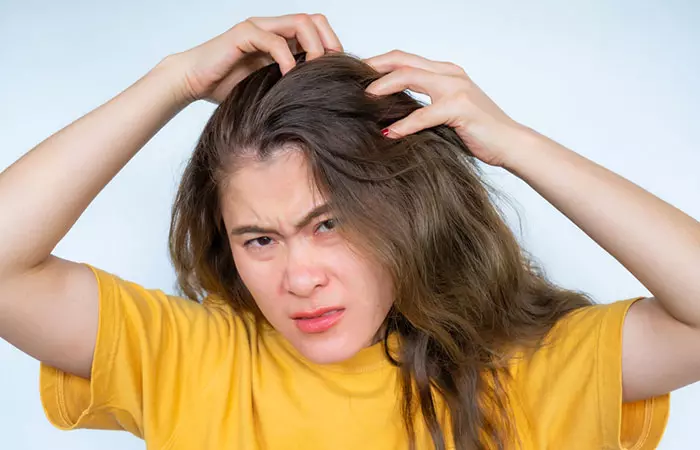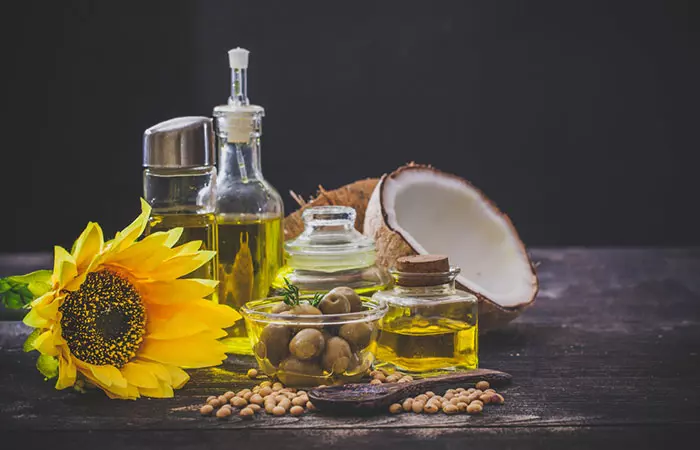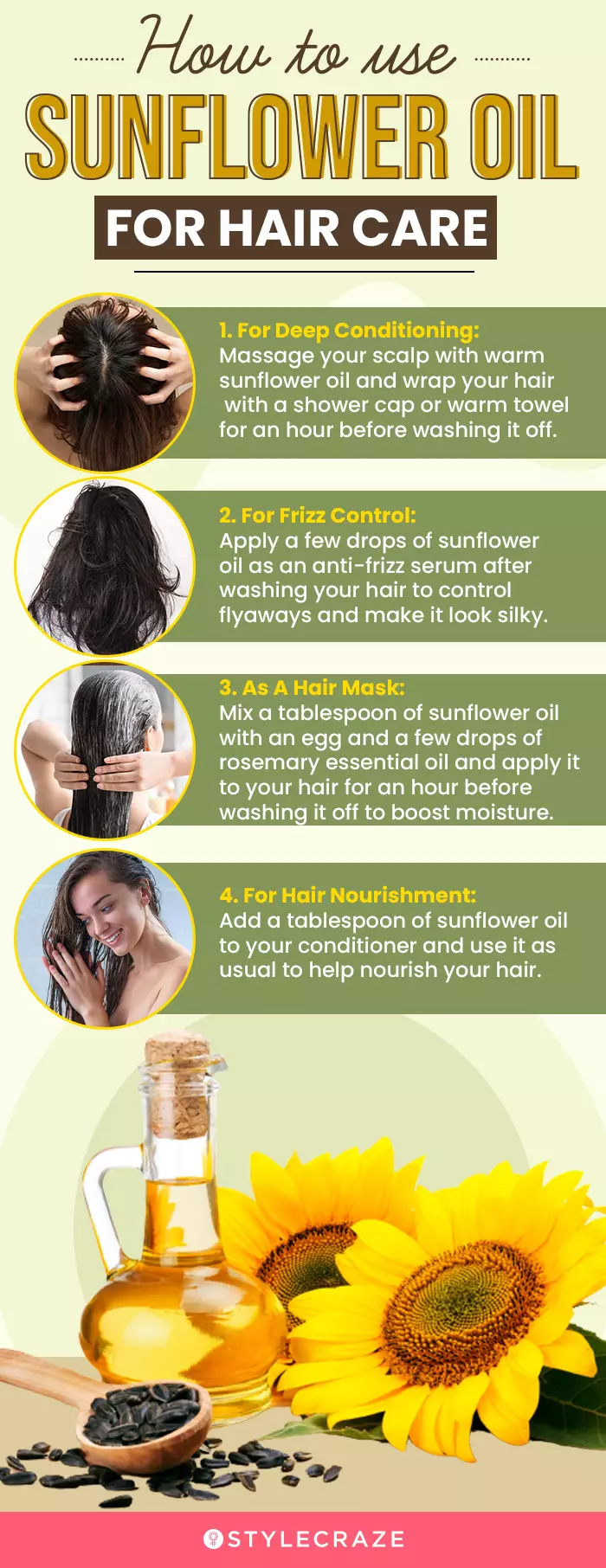What Is Sunflower Oil?
Sunflower oil is a popular vegetable oil extracted by pressing the seeds of the Helianthus annuus plant. It is known for its high smoking point and light flavor and is commonly used in cooking and salad dressings. The benefits of sunflower oil are quite well-known as this oil is rich in unsaturated fats and may help boost heart health and digestion when used in moderation. It is used in many cosmetic formulations due to its nourishing and lightweight properties. Also, you can use this oil as a natural deep conditioning treatment that may help moisturize the hair and nourish dry and damaged hair without weighing it down. What Are Its Benefits? It moisturizes, repairs, and adds shine to the hair as well as soothes scalp inflammation. Who Can Use It? All except people who are allergic to pollens or sunflower seeds. How Often? 1-2 times a week for scalp treatment, or as a conditioner or hair mask. Caution Heat styling your hair after applying the oil can cause serious damage.
Let’s find out whether using this oil is good for hair in the following section.
Is Sunflower Oil Good For Hair?
There is much anecdotal evidence boasting about the umpteen benefits of sunflower oil. The oil is said to treat dandruff, boost hair growth, prevent hair loss, improve hair and scalp cleanliness, and increase hair smoothness. Like all hair oils, this oil also has humectant propertiesi A substance that keeps the skin moisturized, making it supple, wrinkle-free, and healthy. Humectants retain moisture in the skin to prevent moisture loss. and moisturizes the hair and scalp.
Benefits Of Sunflower Oil For Hair
Has Antioxidant Properties: Sunflower oil is rich in vitamin E that has antioxidant properties (1). These antioxidant properties prevent signs of aging caused by free radicals. Has Anti-Inflammatory Properties: Sunflower oil has anti-inflammatory properties and may help treat signs of scalp inflammation like redness, flaking, irritation, and bumps (2). Suitable For Head Massage: Sunflower seed oil is a well-known emollient and can be used to massage the scalp and nourish hair. Research shows that massaging the scalp can stimulate hair growth by improving blood circulation (3). Has Antimicrobial Properties: Research shows that sunflower oil also has antimicrobial and antibacterial properties that can help improve scalp and hair health (2). Protects And Repairs Hair: Sunflower oil contains linoleic acidi An organic compound and a type of omega-6 fatty acid that acts as a building block of body fat and offers health benefits. that is rich in triglyceridesi It is a type of fat converted from unused or excess calories that helps maintain energy levels between meals. . These compounds repair and protect hair (4). Has A Non-Greasy Texture: Sunflower oil is light and non-greasy in texture. These attributes make it an ideal addition to hair care products (4). Moisturizes Hair: Sunflower oil is rich in polyunsaturated fatty acids like oleic and linoleic acidi An organic compound and a type of omega-6 fatty acid that acts as a building block of body fat and offers health benefits. that help moisturize hair (4). May Treat Scalp Acne: Research shows that sunflower oil can help treat acne (5). This may mean it could help treat scalp acne and improve scalp health as well. However, limited research is available in this regard.
Is Rich In Nutrients: Sunflower oil (seeds) also contains niacini A type of B vitamin that helps convert food into energy in the body. , selenium, calcium, and iron (6). A deficiency of these nutrients can cause hair loss (7). Improves Hair Quality: Sunflower oil can penetrate the hair fibers and coat the hair with a thin film to protect it from damage. It also can increase hair shine and decrease surface friction to help fight hair frizz (8). Enhances Hair Elasticity: According to anecdotal evidence, sunflower oil also improves hair elasticity by providing essential nutrients and moisture to the roots. Its lightweight formula also penetrates the hair shaft, reducing breakage and promoting softness.
Anissa Jones, a YouTuber, discusses the recent use of sunflower oil in her hair care routine, prompted by a subscriber’s recommendation. She says, “I’m using it twice a week for a month so I actually really do like it.” She continues, “It is something that you could use every day, since it is so lightweight, but it does make a big difference like my hair looks way shinier now it feels way better (i).” These are the ways sunflower oil could benefit your hair. These sunflower benefits can improve hair health, but you should know the right way of using it. The following section lists a few methods of using the oil to derive the maximum benefit.
How To Use Sunflower Oil For Hair
Deep conditioning treatment: Sunflower oil can be massaged onto the scalp to moisturize the hair and scalp and improve hair strength. It can be used as a hot oil treatment for hair growth as well. Just warm two to three tablespoons of sunflower oil and apply thoroughly to the scalp and hair. Place a shower cap over the hair and leave it on for 45 minutes to an hour. You can also use a warm towel to wrap your hair. Wash as usual Anti-Frizz Drops: Sunflower can help moisturize hair and prevent frizz. Add a drop or two of sunflower oil onto your palm. Rub your palms together to spread the oil and gently rub your palms over your hair. This adds a light shine to your hair and also prevents frizz. Hair Masks: Sunflower oil can be added to homemade DIY masks to improve hair texture and quality. You can pair sunflower oil with honey, coconut oil, essential oils, and eggs for increased hair hydration.
Conditioner And Shampoo: Research shows that adding sunflower oil to your shampoo or conditioner can help moisturize hair while cleansing it too (4).
But before you grab a fresh pack of sunflower oil, here is what you must know – the oil may cause certain adverse reactions too.
Side Effects Of Sunflower Oil For Hair
Topical sunflower oil is generally safe. But it may lead to serious allergic reactions in some individuals. These reactions are caused by particular pollen (9). Hence, it is advised to perform a patch test on the elbow or the back of the neck to check for any adverse effects. If you experience any redness, inflammation, rashes, bumps, etc., consult a doctor. You may continue to use sunflower oil should you experience no allergies. That brings us to a popular question – how is this oil different from coconut oil? Which of the two is better?
Sunflower Oil Vs. Coconut Oil For Hair
Coconut and sunflower oils are both beneficial for hair. However, coconut oil prevents protein loss from hair, while sunflower oil does not (10). While both oils can penetrate the hair fibers, sunflower oil cannot penetrate the cortexi The thickest hair layer, situated between the hair cuticle and medulla, is composed of keratin and melanin, which gives hair its color. . Coconut oil, however, can penetrate the cortex due to lauric acidi A type of beneficial fatty acid found in natural substances such as coconut and palm oils. (8), (10). Can I mix coconut oil and sunflower oil? Yes, you can mix both to get their benefits for your hair. For example, you can combine avocado, honey, coconut oil, and sunflower oil to make a DIY mask. Can I put sunflower oil on my curly hair? Sunflower oil helps lock in the hair’s natural moisture, improving curly hair’s texture, strength, and elasticityi The ability of a substance to regain its original size and shape once an external distorting force has been removed. . It is also very light in texture and would not weigh down your curls. What does sunflower oil smell like? The sunflower oil is extracted from the seeds, not the petals, so it has a resin-like smell. Is sunflower oil good for low porosity hair? Sunflower oil is easily absorbable and light. It helps moisturize and condition your hair simultaneously, making it an excellent hair treatment for low porosity hair types.











